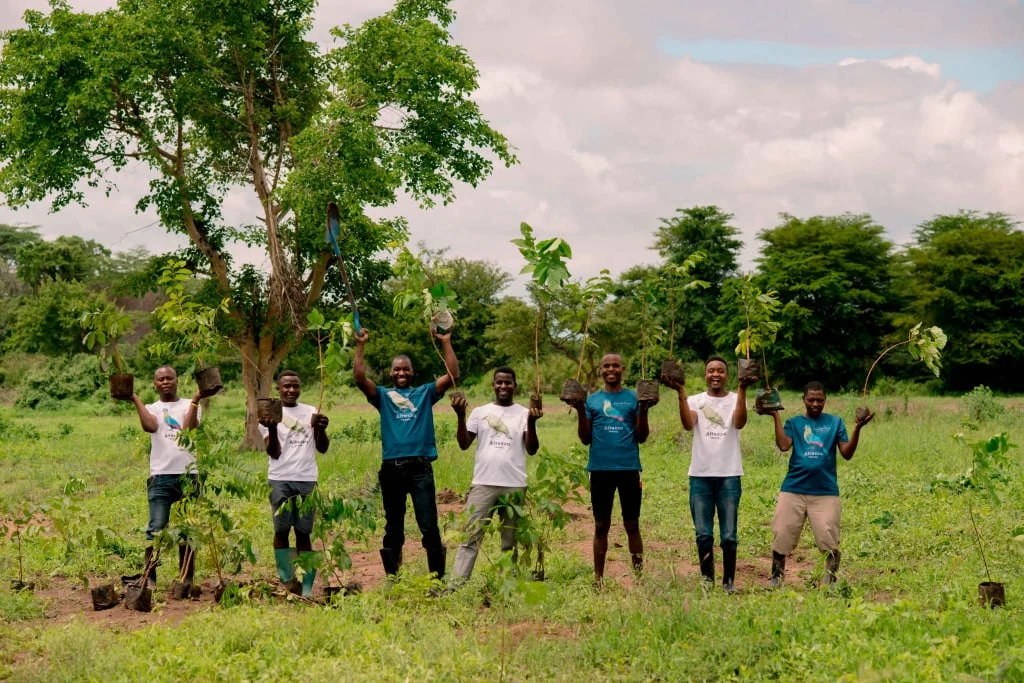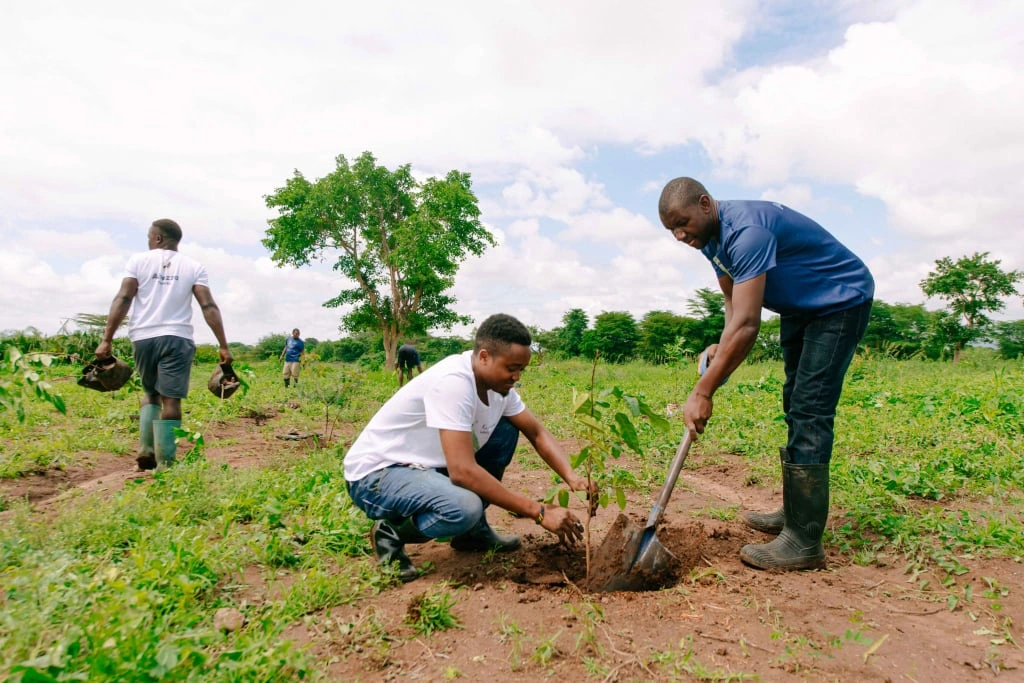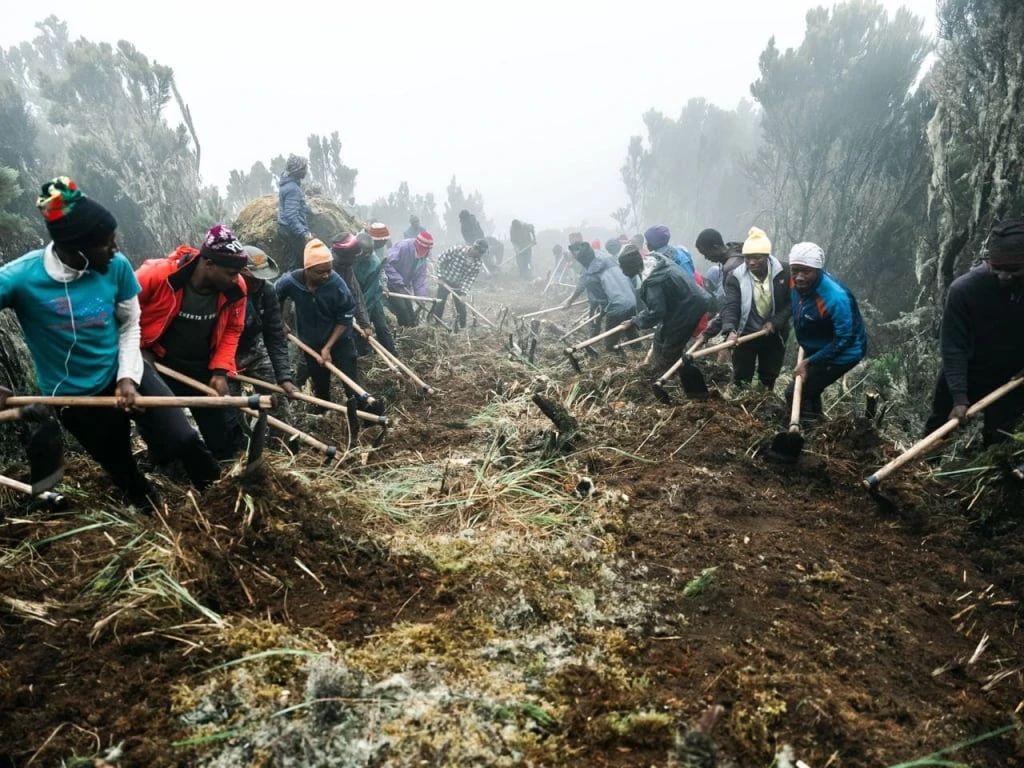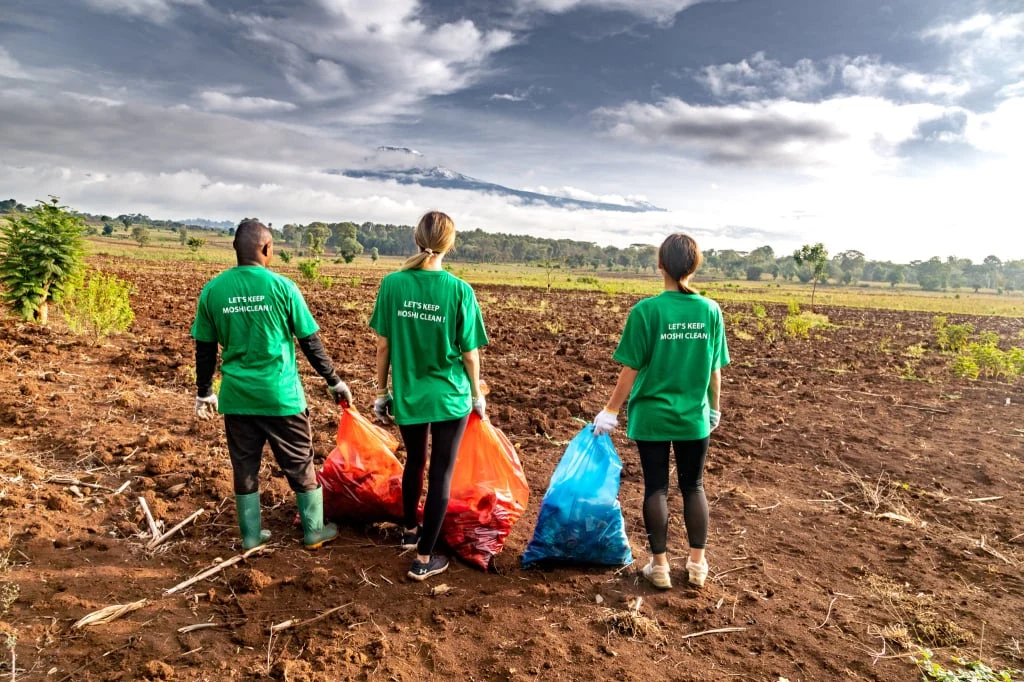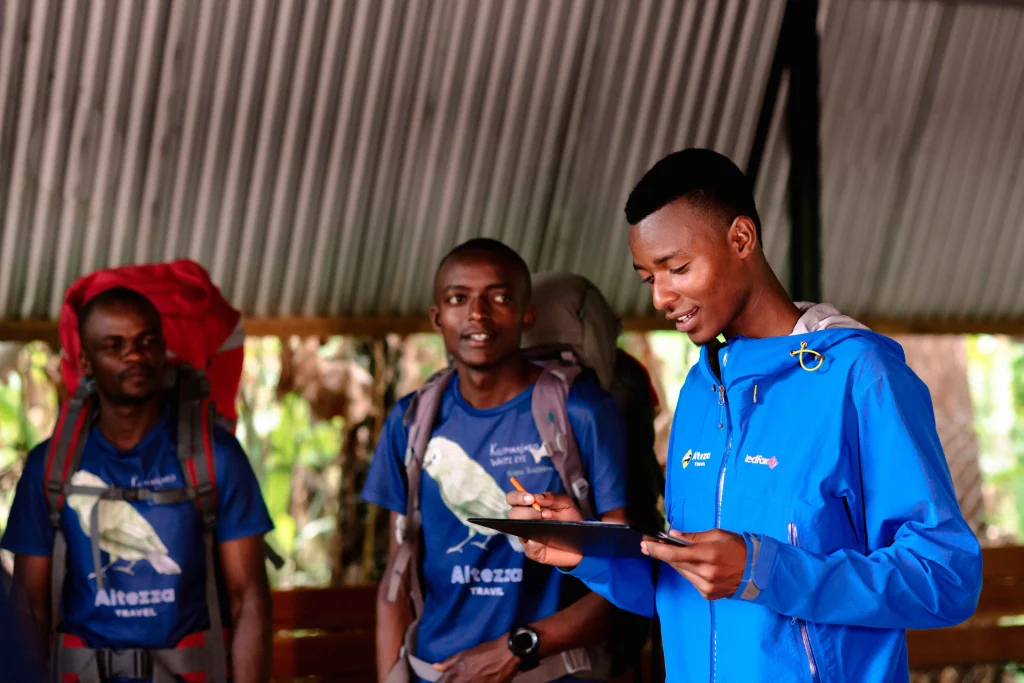All our projects in Tanzania are based on a simple rule:
"Our business must tangibly assist in the restoration of wildlife in Tanzania and support the well-being of the local communities."
We believe that responsible businesses in Tanzania can preserve wildlife diversity and combat poverty only through such an approach.
Why do we do this?
We aspire for all local companies, including our own, to go beyond merely avoiding harm to nature; we encourage active contributions to mitigating the impacts of hunting, poaching, deforestation, and river and air pollution.
To highlight the rapid rate at which human activities are affecting nature, consider the situation of some of Africa's most iconic animals:
Lions: According to a report by the World Wildlife Fund (WWF), the lion population in Africa declined by 41% between 1993 and 2014. While data for Tanzania as a whole is lacking, in the Selous Game Reserve, the lion population plummeted from about 3,000 in 2000 to just 1,000 by 2013.
Elephants: The International Union for Conservation of Nature (IUCN) states that between 2009 and 2014, Tanzania lost 60% of its elephants, their population shrank from 110,000 to 43,000. It's important to note that elephants have no natural predators. Except in rare instances where lions attack very young elephants, these animals either die of natural causes or are killed by hunters and poachers.
Giraffes: According to IUCN data, the giraffe population in Kenya and Tanzania was 71,000 in the mid-1980s. By 2018, it had dropped to 35,000, despite the fact that hunting giraffes is officially banned in both countries. In Tanzania, the giraffe is considered a national symbol, and penalties for killing one are severe.
Rhinoceros: The black rhinoceros is one of the most vulnerable species in Tanzania. In 1970, there were over 10,000 black rhinos, but today there are just a little over 200 left. Special zones have been established in national parks to help restore the population.
In addition to wildlife conservation issues, Tanzania faces challenges with unemployment and low wages. According to the World Bank, out of the country's 60-million population, 27 million people live on less than $1.90 USD per month. Earning $200-$300 per month is considered a good salary here.
For us, it is crucial that Tanzanians who work for us or simply live near Altezza Travel derive tangible benefits from our activities in their country. We do not support capital outflow from developing countries; otherwise, they will remain developing.
What are we doing to restore nature?
We have planted over 1,000 trees in the Rundugai Springs area. This is one of the few beautiful spots in Kilimanjaro where you can swim and sunbathe. The abundant water makes the grass lush and thick, and so the local Maasai bring their livestock to graze in this area. Along with the grass, goats would consume young tree shoots, uprooting them in the process. This scenic oasis was starting to turn into a semi-desert.
The Altezza Travel team not only planted new trees but also established a protected zone around the new plantings to ensure that animals do not destroy them again. In 10-15 years, a dense forest will have grown here.
Read more about this project in our article.
We've also planted an additional 400 trees near the base of Mount Kilimanjaro, in collaboration with the national park administration. This was necessary to stop locals from entering the park to collect firewood, thereby harming the ecosystem. Moreover, the nearby river was causing soil erosion that could lead to road collapses.
As our trees grow, people will no longer need to enter the national park for firewood; they can collect it from our forest. The issue of road collapse is also gradually being resolved: tree roots are strengthening the soil and preventing water from coming too close. Read more about this project in another article.
We've donated $12,000 to an organization called Nature Tanzania. The money will go towards a project aimed at restoring the population of Long-billed Tailorbirds. These African birds live in the Amani forest in northeastern Tanzania, and their population is now less than 250.
Their population is decreasing for a quite unexpected reason. Previously, black pepper was grown in their habitat. It grows like a vine and clings to the trunks of neighboring trees. It didn't require cutting down the forest where the tailorbirds live, and so the farmers' activities did not threaten the birds. Over time, it became more profitable to sell cardamom instead of pepper. Cardamom grows like a bush, and the forest interferes with its growth. Therefore, local residents began clearing plots for plantations, destroying the tailorbird's habitat.
The problem could only be solved by halting the deforestation, requiring the farmers to switch back to growing pepper instead of cardamom.
This project is based on principles of mutual benefit. The farmers were not just educated about the uniqueness of the Long-billed Tailorbirds but were also assisted with their business. They have stopped cutting down the forest for plantations and have switched back to growing black pepper. Nature Tanzania specialists have helped them improve the packaging of their pepper to make it more marketable, thus keeping the farmers interested in the initiative.
The money we've allocated goes towards monitoring the habitat of the Long-billed Tailorbird, counting the population, and training local students who are working on the project.
By the way, Altezza Travel is a company involved not only in conservation but also in supporting the farmers. The black pepper from the Amani forest is used in our Aishi Machame Hotel and Brubru Lodge kitchens, and we have extensive partnerships with other small local farmers that supply us with fresh produce.
Each month, we donate between $500 and $700 to the Serengeti De-snaring Project. His organization was founded by the Frankfurt Zoological Society, one of the oldest and most reputable. The project's goal is to track down poachers and collect traps set for animals in the Serengeti National Park. Our money goes towards fuel for patrol vehicles, food, and ranger salaries.
We allocate $1000 annually to the Mkomazi Rhino Sanctuary. A baby rhino was born in the Mkomazi National Park, and the park administration asked us to allocate funds for its maintenance. The population of black rhinos in Tanzania is under serious pressure from poachers. They are generally considered the rarest of all large African animals, being on the brink of extinction. The Mkomazi Rhino Sanctuary maintains a small population of these animals but needs help. Altezza Travel agreed to sponsor the care of the little rhino, which the park staff named Altezza.
Our mountain teams participate in firefighting on Mount Kilimanjaro. In 2020 and 2022, major fires broke out on Mount Kilimanjaro. The forest burned so severely that the fire was clearly visible from the city of Arusha, 100 kilometers (62 miles) away from the epicenter.
For firefighting, Altezza Travel outfitted and dispatched more than 200 people. We dug firebreaks around the ranger huts to prevent the fire from spreading there. We covered all the costs for equipment, food, and team salaries ourselves (around $16,000).
For more details, read our article about firefighting efforts on Kilimanjaro.
Cleaning up Kilimanjaro. Tourists scatter wet wipes, plastic bags, chocolate wrappers, and empty bottles on Kilimanjaro. Two or three times a year, we send specialized teams to the mountain to collect all the garbage and remove it from the national park. More details can be read in this article.
In the Machame area where we live, Altezza Travel team organizes community clean-up events n Saturdays. We like to live in a clean environment, so every month our team cleans up a 10-kilometer (6-mile) stretch along the road where passing drivers have thrown empty bottles, bags, and other litter.
What do we do for the local people?
Altezza Travel employs 230 people in our hotels and offices. In addition, our mountain teams consist of over 1,500 individuals. We are the largest tourism company in Kilimanjaro, and we strive to ensure that our employees' working conditions are comparable to European standards.
Altezza Travel pays the highest salaries in the tourism industry
On average, a mountain guide in Kilimanjaro earns $15-20 per day. The minimum wage at Altezza Travel is $35, and experienced guides earn even more.
The average salary of an office employee at Altezza Travel in their first year is $400. Other tourism companies usually pay between $150-300. Experienced Tanzanian managers at our company earn $800-1400, which is four times the average national salary.
We are the only tourism company in Tanzania that accounts for inflation and conducts annual salary indexing. At the end of each year, we also give bonuses to our employees.
Providing health insurance
For our employees and their family members, our company covers full medical insurance and pays for medical expenses not covered by insurance.
Hiring new graduates and people without education
Young Tanzanians can join Altezza Travel without experience or even without an education. We focus on honesty, responsibility, and hard work rather than degrees. For example, a young man named Amana came to us with a strong desire to work but without knowing English. We gave him a job in our mountain gear warehouse where knowing Swahili and basic communication skills are sufficient. Now, Amana performs excellently and easily prepares equipment for expeditions. Surprisingly, candidates with degrees sometimes prove to be far less resourceful.
Most of our office employees are women
Of the two hundred office employees at Altezza Travel, more than half are women. For conservative Tanzania, this is a very high ratio. Women here are often denied employment solely based on their gender, but not at Altezza Travel.
At our company, women don't just work in traditionally "female" roles like reservations and in hotels; they also work as drivers and even as porters.
We value the hard work of porters
Porters are the backbone of any Kilimanjaro expedition. They carry equipment, set up tents, fetch water, assist guides during the summit hike, and carry the backpacks of exhausted clients.
There are always more people wanting to work as porters than there are expeditions, and unscrupulous tour operators exploit this. In order to offer the client a lower price, they skimp on the team: paying low wages, providing only rice for meals, and offering subpar tents that are cold, cramped, and damp at night. As a result, porters often fall ill, which is very dangerous in the mountains.
For the porters at Altezza Travel, we've created the best possible working conditions. We are a member of , pay the highest salaries on Kilimanjaro, serve three hot meals a day during expeditions, provide sturdy tents, and cover medical expenses in case of injury.
To find out what KPAP is and what else we do for our teams, you can read our article or watch the video:








 Get Your Packing List
Get Your Packing List 
 Message us on WhatsApp
Message us on WhatsApp 











